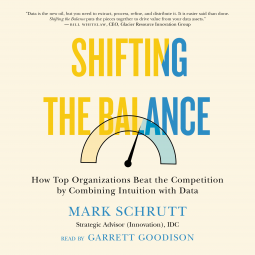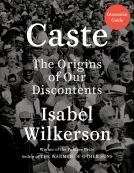
Shifting the Balance
How Top Organizations Beat the Competition by Combining Intuition with Data
by Mark Schrutt
Narrated by Garrett Goodison
This title was previously available on NetGalley and is now archived.
Send NetGalley books directly to your Kindle or Kindle app
1
To read on a Kindle or Kindle app, please add kindle@netgalley.com as an approved email address to receive files in your Amazon account. Click here for step-by-step instructions.
2
Also find your Kindle email address within your Amazon account, and enter it here.
Pub Date Apr 06 2021 | Archive Date Apr 30 2021
Talking about this book? Use #ShiftingtheBalance #NetGalley. More hashtag tips!
Description
Digital transformation expert Mark Schrutt reveals how the world’s top companies are using vast amounts of data to inform their decisions, disrupt industries, and get closer to their customers. Businesses that continue to rely only on intuition do so at their peril.
What if you had the data you always wanted and could tell what was truly an emerging trend that would forever change your industry? Shifting the Balance analyzes the turn towards data-driven decision-making and describes how best-in-class organizations use data to shift their field of vision so it is forward-looking instead of reactive. Case studies with practical examples of how leading businesses address key challenges on the path to becoming data-driven include:
• How companies such as Hewlett-Packard and Land O’Lakes, whose industries are defined by resellers, are connecting directly with their customers to improve satisfaction and relevancy
• How data-driven decision-making shaped the largest one-sided deal in sports, paying the owners of a team that did not play a game for 40 years over $800 million
• How companies such as Peloton and UberEats are using data-driven decision-making to disrupt and reimagine the fitness and restaurant industries
• What professional sports franchises such as the Oakland A’s, Philadelphia Eagles, and Toronto Maple Leafs can teach us about using data in game-changing business decisions
Shifting the Balance offers a roadmap that will enable organizations to make better business decisions that drive even better results, and provides a fascinating read along the way.
Available Editions
| EDITION | Audiobook |
| ISBN | 9781773057576 |
| PRICE | |
| DURATION | 8 Hours, 36 Minutes |
Featured Reviews
In Shifting the Balance, Mark Schrutt asserts that while data is more plentiful than it has ever been, organizations still have a tendency to rely on intuition when it comes to making decisions. He points out that some executives and leaders make decisions they are not necessarily qualified to make because being armed with data, but not having the skills required to analyze that data properly or having fragmented data offers a degree of false confidence. He begins with several examples of how businesses with too much reliance on intuition made tragic mistakes.
Schrutt predicts we’re entering a shift from complete reliance on intuition into a combined reliance on intuition based on data analytics for decision making. Artificial intelligence will help remove margin of error. In addition, AI enables a business to make decisions based on future prospects rather than historical performance. He argues that intuition still has a place, but it should be reinforced with accurate data. He also predicts the wealth of data available in seemingly unrelated industries that can be leveraged to further reinforce decisions.
Schrutt’s point that AI will enable businesses to make decisions based on predicted success instead of historical data is an exciting prospect. Too often, businesses rely solely on past performance as an indicator of what can be expected, but AI can identify those granular hidden trends even the best human mind might overlook, combine these with external influences and relationships, and offer a more accurate view of what can be expected. The question then becomes are we influencing AI or being influenced by AI? It’s both an exhilarating and frightening idea when you consider the possibilities.
Readers who liked this book also liked:
Silvia Moreno-Garcia
Historical Fiction, Literary Fiction, Sci Fi & Fantasy
L.M. Montgomery, Crystal S. Chan, Kuma Chan
Children's Fiction, Comics, Graphic Novels, Manga, Teens & YA


















